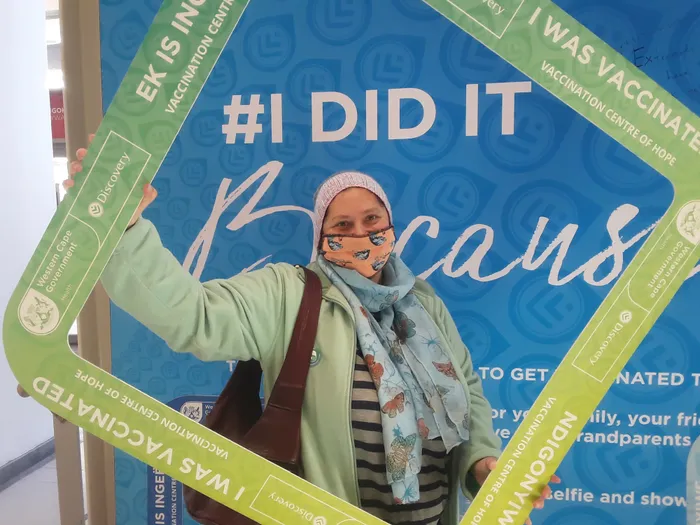’No one is safe until everyone is safe’

Melissa Bizarro, of Diep River, went to the CTICC for her vaccination.
Covid-19 cases among health-care workers have been lower during the third wave, and this is because they were the first to be vaccinated, says Professor Hassan Mohamed, from the Western Cape Department of Health.
Professor Mohamed tackled several misconceptions about vaccinations during an online presentation to the University of the Third Age (U3A) last week.
His talk, "COVID-19 vaccines: one of the most remarkable scientific achievements of the last 100 years", covered the history of vaccinations, what they are, how they work, their possible side-effects and what is available.
Professor Mohamed said we were in the midst of the third wave, but in the plateau period, and we would soon see a downturn in cases. As of Monday August 2 the Western Cape had 40 252 cases (3 820 in the southern district), 15 288 deaths and 1 146 302 vaccinations.
It was a common myth, he said, that those who were vaccinated could not get Covid. “Those who are vaccinated could still contract coronavirus. People must continue wearing masks and physically distance. The vaccine lowers the risk of transmission and reduces the risk of hospitalisation and death.”
The Covid vaccine was a piece of germ or organism injected into the body to provoke an immune response that the body could detect, he said. “So when the real deal comes along, our immune system can respond quickly.”
The vaccine could not multiply and give someone coronavirus. And the mRNA (messenger ribonucleic acid) molecule, a key part of the Pfizer vaccine, was found normally in the body and did not harm our DNA.
Vaccines, he said, lasted between six to nine months. There had been talk of having booster shots, he said, but right now the goal was to get as many jabs into arms as possible.
A common concern, he said, was that the vaccines had arrived too quickly without enough time to test them thoroughly but that swift availability was the result of worldwide collaboration and more robust clinical methodology in a highly regulated testing and peer-review world. Scientists had also built on the research and ample funding that had followed the earlier SARS and MERS coronavirus outbreaks.
Vaccination side-effects included discomfort at the injection site, headaches, flu-like symptoms, fever, chills and rashes. If side-effects continued after three days, he advised visiting a doctor and emailing immunisation advocate Sonia.Botha@westerncape.gov.za.
We had vaccination programmes to thank for the eradication of smallpox and polio, he said.
All the available vaccines, with the exception of the Johnson & Johnson (J&J), required a double dose, he said.
South Africa began with the J&J Sisonke clinical trial in health-care workers. Since May 17, South Africa began vaccinating people with Pfizer, given 42 days apart, to people over the age of 60. In July the pace picked up with people over 50, then over 35. From Wednesday September 1, people over the age of 18 can be vaccinated.
U3A chairperson Dr Carel van der Merwe said the World Health Organization had pushed the “no-one is safe until everyone is safe” message to get the public to grasp the importance of the need for a global response to Covid-19. “That’s our take-home message but there are people around who are vaccine denialists, and they are a menace to those who aren’t.”
Meanwhile, Covid active cases are continuing to rise steadily in the suburbs, including Plumstead, although the numbers are declining in Wynberg, according to Western Cape Department of Health spokesperson Natalie Watlington.
Ms Watlington said 207 547 people over 60 in the province had been partially vaccinated and 220 687 had been fully vaccinated.
In the over-50 age group, there are 294 558 partially vaccinated and 200 873 fully vaccinated, and for the 35-to-49 age group, 113 572 are partially vaccinated and 79 964 fully vaccinated.
She stressed that vaccinations were free.
Ms Watlington said it took a few weeks after the second dose, or the first dose in the case of the J&J vaccine, before protection reached its maximum level.
It was important for everyone to continue taking precautions until there was population immunity, she said.
Melissa Bizarro, of Diep River, said she had gone to the Lady Michaelis hospital for a vaccination but it had been busy so she had gone on to the CTICC vaccination site. She said she had been very impressed with the efficiency and friendliness there.